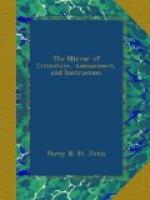—Memoirs of the Duchess of Abrantes.
* * * * *
SOUNDS DURING THE NIGHT.
The great audibility of sounds during the night is a phenomenon of considerable interest, and one which had been observed even by the ancients. In crowded cities or in their vicinity, the effect was generally ascribed to the rest of animated beings, while in localities where such an explanation was inapplicable, it was supposed to arise from a favourable direction of the prevailing wind. Baron Humboldt was particularly struck with this phenomenon when he first heard the rushing of the great cataracts of the Orinoco in the plain which surrounds the mission of the Apures. These sounds he regarded as three times louder during the night than during the day. Some authors ascribed this fact to the cessation of the humming of insects, the singing of birds, and the action of the wind on the leaves of the trees, but M. Humboldt justly maintains that this cannot be the cause of it on the Orinoco, where the buzz of insects is much louder in the night than in the day, and where the breeze never rises till after sunset. Hence he was led to ascribe the phenomenon to the perfect transparency and uniform density of the air, which can exist only at night after the heat of the ground has been uniformly diffused through the atmosphere. When the rays of the sun have been beating on the ground during the day, currents of hot air of different temperatures, and consequently of different densities, are constantly ascending from the ground and mixing with the cold air above. The air thus ceases to be a homogeneous medium, and every person must have observed the effects of it upon objects seen through it which are very indistinctly visible, and have a tremulous motion, as if they were




